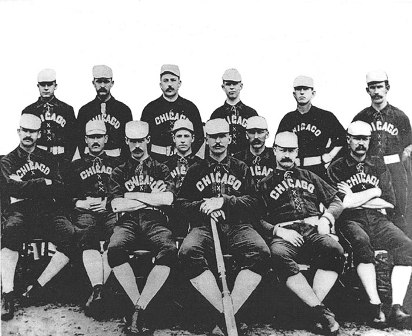Adrian Constantine “Cap” Anson’s Chicago White Stockings cruised to the National League championship in 1880. The team was never out of first place and won the pennant by 15 games over the Providence Grays.
Two influential newspapers, The Cincinnati Enquirer and The Washington Capital spent the offseason downplaying the White Stockings’ victory and questioning the team’s integrity.
The Enquirer’s OP Caylor had a long-time feud with White Stockings—and National League President William Hulbert–which heated up further at the close of the 1880 season when the Cincinnati Reds were banished from the National League. Cincinnati management routinely leased the team’s Bank Street Grounds out for Sunday games—games where beer was sold as well. Hulbert pushed through a ban on both practices for the 1881 season, then, as was his original intent, forced the Reds out of the league.
Caylor attributed the White Stockings’ success to favorable schedules approved by Hulbert’s “well-trained minions,” and he declared:
“The League, as owned and operated by Hulbert, is rotten and corrupt.”
The Capital, an independent, crusading weekly, took it further. Not content to limit the accusations to off-field corruption, the paper claimed it was common knowledge Chicago had thrown games late in the season.
Over their last fourteen games, the White Stockings were 9-4 with a tie. The Capital said:
“Everybody knows that when the Chicagos had the championship well in hand last season they gave games away to attract gate money…(Hulbert) does not seem to know that the public knows that every time his league goes into secret session it is to concoct some means of swindling the public or the players, or both.”
The Chicago Tribune would not let the insults stand. Their defense was no surprise, in 1875 the paper’s baseball writer, Lewis Meacham had been Hulbert’s conduit for selling the public on the formation of the National League as a successor to the National Association–a league free of drunkenness, gambling and corruption. While Meacham had died in 1878, the paper remained Hulbert’s staunch ally. The Tribune said:
Silly Assertions by a Brace of Newspaper Nincompoops
“Everybody knows that this assertion is a silly falsehood, without a shadow of basis in fact or reasonable probability. So far from losing games to attract gate-money, the Chicago club finds that nothing pays so well as to win all games and lose none. If such a thing were not possible, the club that should go through the greater part of a season without once suffering defeat would attract more patronage and make money than any club ever organized.
“Reason and fairness are, however, wasted upon two such hopeless imbeciles as the fellows who butcher base-ball in the columns of The Washington Capital and The Cincinnati Enquirer.”
The Tribune said jealousy over the lack of a National League club in each city was the only explanation:
“The Capital man has been standing on his head ever since the League was impelled by geographical reason to refuse the Washington club’s application for admission; and The Enquirer man has been similarly inverted both as to body and brain ever since the Cincinnati Club was kicked out of the League on account of its refusal to abolish Sunday games and beer jerking on the club grounds in Cincinnati.”
like most 19th-Century allegations of malfeasance on and off the field, the allegations were quickly forgotten.
The White Stockings cruised to another championship in 1881 with a 56-28 record, finishing nine games ahead of second place Providence. It was Hulbert’s final season. He died three weeks before opening day in 1882.
The Tribune, Hulbert’s greatest ally to the end, said upon his death:
“His great force of character, strong will, marked executive ability, unerring judgment of men and measures, and strict integrity and fairness were of incalculable value to the league, and he was rightly considered to be the brains and backbone of that organization. In him, the game of base-ball had the most useful friend and protector it has ever had; and in his death the popular pastime suffers a loss the importance of which cannot easily be exaggerated.”




Leave a comment